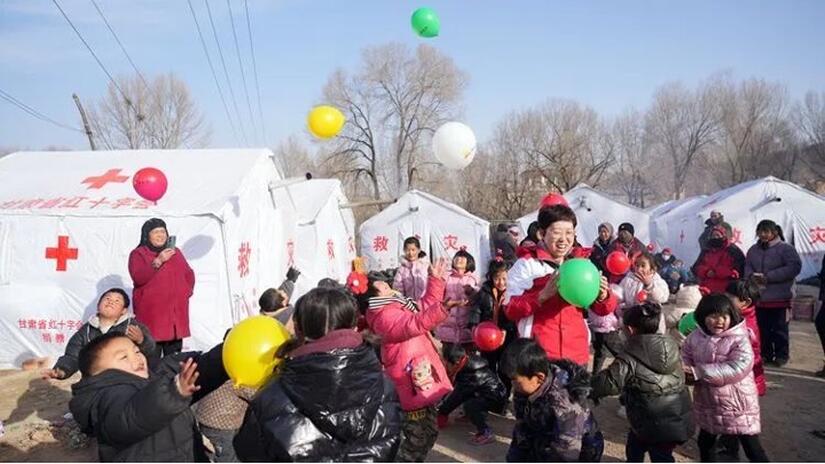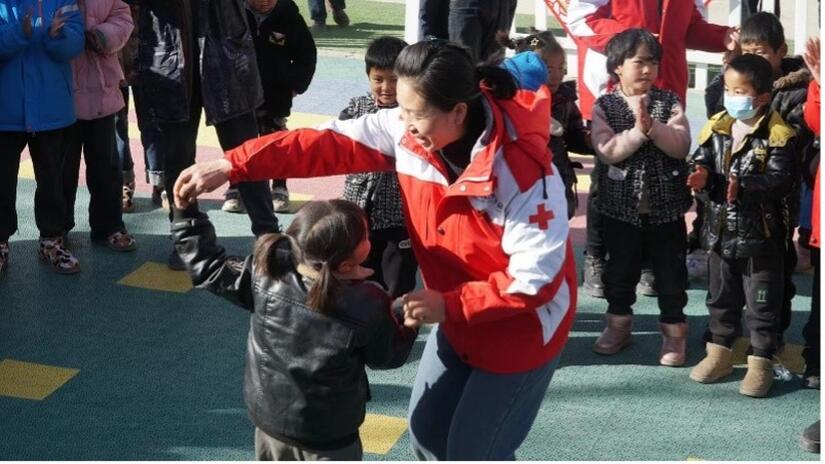Just more than one month ago, a 6.2-magnitude earthquake struck Linxia Prefecture of Gansu Province in China. The quake struck at midnight on December 18, 2023, as people were sleeping through a cold winter night, destroying homes and claiming lives.
With its well-developed disaster preparedness capacity and an established cooperation mechanism with its provincial chapters, the Red Cross Society of China (RCSC) responded immediately, swiftly carrying out rescue and relief work as it raced with time to save lives.
The first batch of relief items dispatched by the RCSC arrived within the first 12 hours after the earthquake.
In coming hours and days, more than 20 Red Cross rescue teams in five categories – from medical relief to psychological support – were dispatched to the disaster area.
The teams carried out comprehensive response work, including search and rescue, basic aid material, psychological support, provision of meals and toilets, construction of resettlement sites, as well as transportation and distribution of disaster relief materials.
Within ten days of the earthquake, the people affected by the earthquake had moved into clean and warm temporary shelters and schools had resumed classes. Now, with the rapid response complete, the operation has moved to the post-disaster recovery and reconstruction stage.

Along with shelter, food, health and other services, the Red Cross Society of China volunteers provided services and activities for children to help them deal with the big life changes and losses brought on by the earthquake.
Photo: Red Cross Society of China
Mental health: a key part of recovery
With the gradual normalization of people’s lives, some places in the village have started to offer skill training courses such as welding, elderly care and housekeeping, with training subsidies provided. The training sessions aim to make people more confident and capable of rebuilding their homes and livelihoods.
Another key building block in the recovery is helping people adjust to the massive disruption the earthquake has had in their lives. This is one reason why volunteers regularly organize counselling sessions, as well as fun, lively activities, and games for children in many of the resettlement areas.
"Are you coming back tomorrow?" one child asks Chunhui Ji, a team leader from the Red Cross's Gansu Mingrui psychological service team after one such joyful session of games at one of the resettlement sites.
"Crisis intervention is an important part of post-disaster recovery,” says Chunhui Ji. “If timely counselling is not provided, it will affect the psychological and even physical health of the affected people long after the disaster, especially affecting the growth of young people.”
The difference the counselling is making can be seen in the way the children interact with each other before and after the sessions. One small boy — frightened by the earthquake and its aftermath — was reluctant to play or talk. After the counselling with the psychological team member, however, his nervousness eased a lot and he began to actively join in the games with his friends.
"Disasters like earthquakes are sudden with serious damage," said Tao Tian, a team member of the psychological rescue team and doctor of Ningxia Ningan Hospital. “Throughout the disaster and post-disaster periods, people may exhibit varying degrees of psychological stress at different times, requiring tailored intervention techniques to help restore mental health.”
The RCSC attached great importance to the mental well-being of the affected people, giving priority to the psychological counselling of adolescents and children. Responding to the imperative need, 25 members from Gansu and Ningxia Red Cross Psychological rescue teams had been fully operational at the resettlement sites since the third day after the earthquake.
“People are exposed to extremely distressing events when disasters, such as an earthquake, happen to them,” says Olga Dzhumaeva, Head of IFRC East Asia Delegation. “Addressing people’s mental health is a vital part of what we do during and after a disaster. Psychosocial support to affected people, including children, is key to humanitarian response, bringing priceless impact on the life of people who are in critical need.”
Some information from Xinhua News Agency

